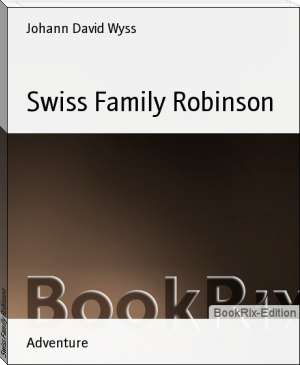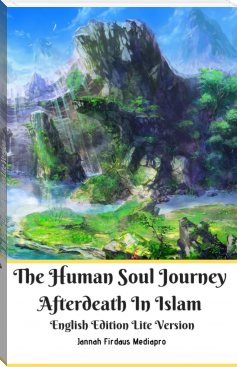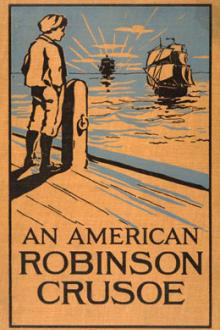Swiss Family Robinson, Johann David Wyss [tools of titans ebook txt] 📗

- Author: Johann David Wyss
- Performer: -
Book online «Swiss Family Robinson, Johann David Wyss [tools of titans ebook txt] 📗». Author Johann David Wyss
were already acquainted with, and not far from the Jackal Cave, as we
called the place where Fangs had been captured in cubhood.
On recognizing the spot, Ernest, who was in advance with one of the
dogs, hastened towards it. We lost sight of him for a few minutes, and
then arose a cry of terror, violent barking and deep, surly growls.
As we rushed forward, Ernest met us, looking white as ashes, and
calling out:
`A bear, a bear, father! He is coming after me!’
The boy clung to me in mortal fear. I felt his whole frame quivering.
`Courage, my son!’ cried I, disengaging myself from his grasp. `We must
prepare for instant defence!’
The dogs dashed forward to join the fray, whatever it was; and not long
were we in doubt. To my no small consternation, an enormous bear made
his appearance, quickly followed by another.
With levelled guns, my brave Fritz and I advanced slowly to meet them.
Jack was also ready to fire, but the shock had so unnerved Ernest that
he fairly took to his heels. We fired together, one at each bear; but
though hit, the monsters were unfortunately only wounded. We found it
most difficult to take aim, as the dogs beset them on all sides.
However, they were much disabled, one having the lower jaw broken, and
the other, with a bullet in its shoulder, was effectually lamed. The
dogs, perceiving their advantage, pressed more closely round their
foes, who yet defended themselves furiously with frightful yells of
pain and rage.
Such was the confusion and perpetual movement of the struggle, that I
dared not fire again, seeing that even slightly wounding one of our
gallant hounds would instantly place him in the power of the raging
bears.
Watching our opportunity, we suddenly advanced with loaded pistols to
within a very few paces of the animals, and firing, both fell dead, one
shot through the head, the other, in the act of rearing to spring on
Fritz, received his charge in its heart.
`Thank Heaven!’ cried I, as with dull groans the brutes sank to the
ground. `We have escaped the greatest peril we have yet encountered!’
The dogs continued to tear and worry the fallen foe, as though
unwilling to trust the appearance of death. With feelings somewhat
akin, I drew my hunting-knife, and made assurance doubly sure.
Seeing all safe, Jack raised a shout of victory, that poor Ernest
might gain courage to approach the scene of conflict, which at last he
did, and joined us in examining the dangerous animals, as they lay
motionless before us.
Every point was full of interest, their wounds, their sharp teeth,
their mighty claws, the extraordinary strength of neck and shoulder,
all were remarked and commented on, and observing that the shaded brown
hair was tipped with glossy white, I thought that these might be the
silver bears* mentioned in Captain Clarke’s journey to the north-west
coasts of America.
* Grizzlies, not polar bears
`Well, my lads,’ said I, `if we have failed to catch sight of
serpents, we have at least made good riddance of some other bad
rubbish! These fellows would one day have worked us woe, or I am much
mistaken. What’s to be done next?’
`Why, skin them, to be sure,’ said Fritz. `We shall have a couple of
splendid bearskin rugs.’
As this process would take time and evening drew on, we dragged the
huge carcases into their den, to await our return, concealing them with
boughs of trees and fencing the entrance as well as we could. The
ostrich eggs we also left behind us, hidden in a sandy hole.
By sunset we reached the tent, and joyfully rejoined my wife and
Franz, right glad to find a hearty meal prepared for us, as well as a
large heap of brushwood for the watch-fire.
When a full account of our adventures had been given, with a minute and
special description of the bear-fight, my wife related what she had
done during our absence. She and Franz had made their way through the
wood up to the rocks behind it, and discovered a bed of pure white
clay, which it seemed to her might be used for making porcelain. Then
she had contrived a drinking-trough for the cattle out of a split
bamboo.
She had arranged a hearth in a sheltered place by building up large
stones, cemented with the white clay; and, finally, she had cut a
quantity of canes and brought them, on the cart, to be in readiness for
the building we had in hand.
I praised the thoughtful diligence which had effected so much that was
of real and definite use. In order to try the clay I put some balls of
it in the fire now kindled to burn during the night, and we then betook
ourselves to rest under shelter of our tent.
I awoke at dawn and aroused my little party. My first idea was to
examine the clay balls, which I found baked hard and finely glazed, but
too much melted down by the heat—a fault which, seeing the excellent
quality of the clay, I knew it would be well worthwhile to remedy.
After breakfast, and our accustomed devotions, we harnessed the cart,
and took the way to the bears’ den. Fritz headed the party, and, coming
in sight of the entrance to the cave, called out softly:
`Make haste and you will see a whole crowd of wild turkeys, who seem to
have come to attend the funeral obsequies of their respected friend and
neighbour, Bruin, here. But there appears to be a jealous watcher who
is unwilling to admit the visitors to the bed of state!’
The Watcher, as Fritz called him, was an immensely large bird, with a
sort of comb on his head, and a loose fleshy skin hanging from beneath
the beak. Part of the neck was bare, wrinkled and purplish-red, while
around it, resting on the shoulders, was a downy collar of soft white
feathers. The plumage was greyish-brown, marked here and there with
white patches; the feet appeared to be armed with strong claws. This
great bird guarded the entrance to the cave, occasionally retiring into
it himself for a few minutes; but as soon as the other birds came
pressing in after him, he hurried out again and they were forced to
retire.
We stopped to observe this curious scene, and were startled suddenly by
a mighty rush of wings in the air above us. We looked up; at the same
moment Fritz fired, and an enormous bird fell heavily head foremost on
the rocks, by which its neck was broken, while blood flowed from a
wound in the breast.
We had been holding back the dogs, but they, with Fritz, now rushed
towards the cave, the birds rising around them and departing with heavy
ungainly flight, leaving only Fritz’s prize, and one of the other
birds, killed by the large one in its fall.
With the utmost caution I entered the cave, and rejoiced to find that
the tongue and eyes only of the bears had been devoured: a little later
and we should have had the handsome skins pecked and torn to rags, and
all chance of steaks and bears’-paws gone.
On measuring the wings of the large bird from tip to tip, I found the
length exceeded eleven feet, and concluded it to be a condor; it was
evidently the mate of the `Watcher’, as Fritz called the first we saw.
To work we now went on the bears, and no slight affair we found it to
skin and cut them up, but by dint of perseverance we at last succeeded
in our object.
Determining to smoke the meat on the spot, we cut magnificent hams, and
took off the rest of the meat in slices after the manner of the
buccaneers in the West Indies, preserving the paws entire to be cooked
as a delicacy, and obtaining from the two bears together a prodigious
supply of lard, which my wife gladly undertook to melt and prepare for
keeping.
The bones and offal we drew to some distance with the help of our
cattle, and made the birds of the air most welcome to feast upon it.
This, with the assistance of all sorts of insects, they did so
effectually that before we left the place the skulls were picked
perfectly clean, the sun had dried them, and they were ready for us to
carry off to our museum.
The skins had to be very carefully scraped, washed, salted, cleansed
with ashes and dried, which occupied fully two days.
I was lamenting our distance from the rascusara* tree, the leaves of
which had flavoured our roast peccary so nicely, when I observed among
the brushwood which the boys had brought from the thickets around us, a
climbing plant, whose leaves had a very strong smell; the stem
resembled a vine, and the fruit grew in clusters like currants. Some
were red, and some of a green colour, which I supposed to denote
various degrees of ripeness. They were hard, and the outer skin was
quite thin. I recognized in this the pepper plant, a discovery
particularly agreeable at this moment.
* Previously he called it ravensara.
The boys soon gathered a large supply; the red berries were soaked in
salt and water for several days, then washed and rubbed, and finally,
becoming perfectly white, were dried in the sun. The treatment of the
green berries was simple; they were merely exposed to the sun’s heat
for a day or two, and then stored: in this way we obtained enough, both
of black and white pepper, to last us a very long time.
I took also a number of young plants, that we might have pepper
growing at Rockburg and our various settlements. Some roots of another
plant were also taken, which, from the pods, appeared to be a kind of
bean.
We were glad of this occupation during the tedious business of smoking
the bears’ meat, and availed ourselves of the leisure time by also
preparing for stuffing the condor and the turkey buzzard, urubu or
black vulture—for I could not determine to which species the smaller
bird belonged.
The four boys at length became so weary of inaction, that I determined
to let them make an excursion alone on the savannah.
Three of them received this permission with eager delight, but Ernest
said he would prefer to remain with us; to which, as the expedition was
to be entirely one of pleasure, I could make no objection.
Little Franz, on the other hand, whom I would willingly have kept with
us, was wild to go with his brothers, and I was obliged to consent, as
I had made the proposal open to all, and could not draw back.
In the highest spirits they ran to bring their steeds (as we were fain
to call the cattle they rode) from their pasturage at a short distance.
Speedily were they saddled, bridled and mounted—the three lads were
ready to be off.
It was my wish that our sons should cultivate a habit of bold
independence, for well I knew that it might be the will of God to
deprive them easily of their parents; when, without an enterprising
spirit of self-reliance, their position would be truly miserable.
My gallant Fritz possessed this desirable quality in no small degree,
and to him I committed the care of his young brothers, charging them to
look up to and obey him as their leader.
They were well armed, well mounted, had a couple of good





Comments (0)